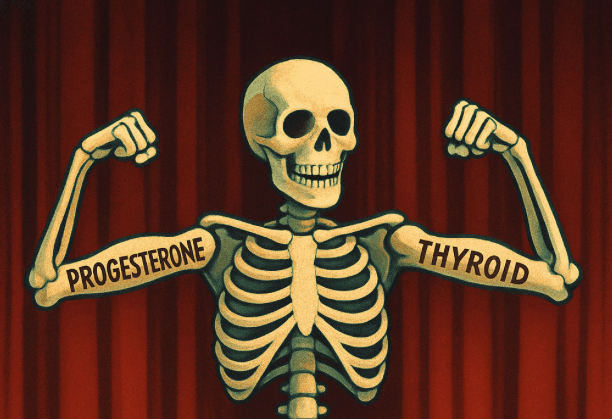Were you born hypothyroid?
When people hear the word "hypothyroid," they picture a tired, foggy, para-menopausal woman wrapped in a blanket and skipping dinner to lose 10 pounds. But what if we’ve had it all wrong? What if hypothyroidism doesn’t start in adulthood, but in the womb?
What if you were born into it?
Fact: we inherit the terrain of our mothers. If your mom was running on stress hormones, estrogen dominant, nutrient depleted, and cold to the touch, chances are your thyroid was set up from day one to underperform. And if she had undiagnosed or untreated hypothyroidism? It likely didn’t stop at her.
Sure, most developed countries do screen newborns for congenital hypothyroidism, a critical step to catch extreme thyroid deficiency. But this screening only catches the most severe dysfunction. If your TSH or T4 wasn’t far outside the box, you were stamped as “normal” and sent on your way.
But here’s what no one talks about:
Stuff Your Doctor Should Know is a reader-supported publication. To receive new posts and support my work, consider becoming a free or paid subscriber.
No one checked your free T3, reverse T3, or antibodies.
No one tracked your basal temperature or pulse to assess your metabolic rate.
No one asked why you were constipated, cold, colicky, or struggling to latch.
Because subtle thyroid dysfunction in babies? That’s not on the radar.
And yet we see the signs early:
– Flat affect
– Poor muscle tone
– Delayed speech
– Chronic congestion
– Poor temperature regulation
– Behavioral dysregulation
– Trouble sleeping
– Chronic infections
In adults, we call this hypothyroidism. In babies, we call it “normal development.” See the disconnect?
“The diagnosis of hypothyroidism in children is missed more often than in adults because the signs are chalked up to other causes—sluggishness, frequent infections, poor growth, or behavioral problems. Yet these are the very children who need thyroid support the most, before lifelong damage sets in.” -Broda Barnes
If mom was surviving on adrenaline and coffee while growing you, and no one helped her regulate her own hormones before, during, or after pregnancy, then her stress became your stress. Her sluggish metabolism became your sluggish metabolism.
This isn’t about blame it’s about recognizing patterns. Because if we want to raise resilient, well-regulated children, we have to stop pretending hormone dysfunction starts at 45. For many of us, it started before we were born.
And this is only part of the story.
Because thyroid dysfunction rarely shows up alone. It’s often entangled with adrenaline dominance, where the body runs on cortisol and stress chemicals instead of nourishment and calm. That fight-or-flight state begins in utero, and if mom never shifts out of it, the baby’s nervous system is wired for hypervigilance from day one.
Then pile on the modern assaults:
A birth system that overuses C-sections, antibiotics, and interventions
The vitamin K shot (often loaded with aluminum or polysorbate carriers)
Multiple rounds of vaccines starting within hours of life
Ultra-processed formula and iron-fortified foods
Endocrine-disrupting chemicals in baby wipes, diapers, bottles, water, and even breast milk
A sterile home environment with little microbial exposure
And suddenly we have infants and toddlers with:
Poor gut diversity
Food intolerances
Loss of oral tolerance
Eczema, constipation, and chronic ENT issues
And a growing list of developmental delays and sensory issues
“Many babies are born with low metabolic rates, not because of a defect, but because of maternal stress, poor nutrition, or hormonal imbalances during pregnancy. Supporting thyroid function early on can make the difference between a child who thrives and one who struggles through every stage of development.”
-Ray Peat
Then comes puberty or what’s now often early puberty. We’re seeing girls as young as 7 or 8 with breast development, mood swings, and hormonal acne. This isn’t normal. This is estrogen dominance playing out in prepubescent bodies. And it’s not just the girls. Estrogenic overload paired with thyroid suppression and poor adrenal regulation shows up in apathetic, anxious, emotionally dysregulated, and gender confused preteens.
The Forgotten Clues: What Broda Barnes and Ray Peat Said About Hypothyroid Children
Long before modern medicine caught on to the subtleties of hormone dysfunction, two renegade thinkers were sounding the alarm: Dr. Broda Barnes and Dr. Ray Peat.
Barnes, a physician and researcher in the mid-1900s, argued that hypothyroidism was not only vastly underdiagnosed, but that the consequences started as early as infancy. In his book Hypothyroidism: The Unsuspected Illness, he described children with low thyroid as chronically sick, underperforming in school, frequently battling infections, or simply "not thriving." He challenged the overreliance on lab tests and instead used temperature, pulse, and symptoms to assess thyroid function even in babies. To him, these were children waving red flags, and doctors weren’t trained to see them.
Ray Peat, the biologist who turned hormone dogma on its head in the 80s and beyond, took it even further. He believed many children were born hypothyroid not from genetics, but from maternal stress, high estrogen, and low progesterone in utero. According to Peat, the metabolic environment of the mother sets the tone for the baby’s thyroid function. He often pointed out that modern birth interventions, like synthetic vitamin K shots, early vaccines, and the stress of labor, can suppress metabolic function from day one.
Both men believed hypothyroidism was a slow burn starting in childhood and misdiagnosed as everything from ADHD to failure to thrive, allergies, mood disorders, and even so-called “constitutional” sluggishness. Their work reminds us: sometimes the root cause isn’t rare, it’s just ignored.
What They Recommended
Both Barnes and Peat believed in early, proactive support, rather than waiting for a full-blown diagnosis. Barnes was famous for prescribing natural desiccated thyroid (NDT) to children who showed signs of low function, even when labs looked “normal.” He emphasized the use of temperature and pulse as primary tools to guide dosing, not just lab values. He also believed that correcting thyroid early could prevent a lifetime of chronic illness, from obesity to heart disease.
Peat echoed this philosophy, although he was more focused on maternal and environmental factors. He emphasized nutrient-rich diets for both mothers and children, especially adequate protein, calcium, vitamin A, magnesium, and thyroid-supportive carbs like fruit and root veggies. He also warned against excess polyunsaturated fats (PUFAs), which he believed suppressed thyroid function even in infancy.
For Peat, the goal wasn’t just to medicate a child, it was to nourish their metabolism, protect them from stress hormones (like excess adrenaline and cortisol), and support the body’s own thyroid system to wake up and work better.
In short, they weren’t just trying to “treat” hypothyroidism, they were trying to prevent it from being ignored in the first place.
So what can we do?
We stop pretending this is normal. We stop waiting for symptoms to scream loud enough to be called disease. And we start supporting thyroid and metabolic function before symptoms even show up.
For mothers (or future mothers):
Test your full thyroid panel (TSH, Free T3, Free T4, Reverse T3, antibodies)
Track your basal temperature and pulse to assess metabolism
Eat a nutrient-dense, pro-metabolic diet rich in carbs, protein, and saturated fats
Get enough sodium, potassium, magnesium, and bioavailable copper
Lower adrenaline output: breathwork, prayer, sunlight, walking after meals
For babies and young children:
Watch for cold extremities, constipation, fatigue, poor sleep, poor tone
Feed them real food early (egg yolks, liver, bone broth, fruit, raw dairy if tolerated)
Avoid plastics, soy formula, heavily fortified cereals, and endocrine disruptors
Support gut diversity with microbial exposure, not just supplements
Prioritize rest, sunlight, blood sugar balance, and safe attachment
And most importantly: track their pulse and temperature. These are free, powerful tools that tell you how their metabolism is doing long before any lab ever will.
Because the goal isn’t just to prevent disease. It’s to build resilience.
Let’s stop assuming thyroid dysfunction begins at menopause. For many of us, it began at birth and for some, even before that.
-Kitty Martone
"Beloved, I pray that all may go well with you and that you may be in good health, as it goes well with your soul." -3 John 1:2
Disclaimer: Please note that the information shared in these articles is for educational purposes only and should not be considered as medical advice. Always consult with a qualified healthcare professional for personalized guidance regarding your health concerns.
Follow me on Instagram @healthygutgirlofficial








